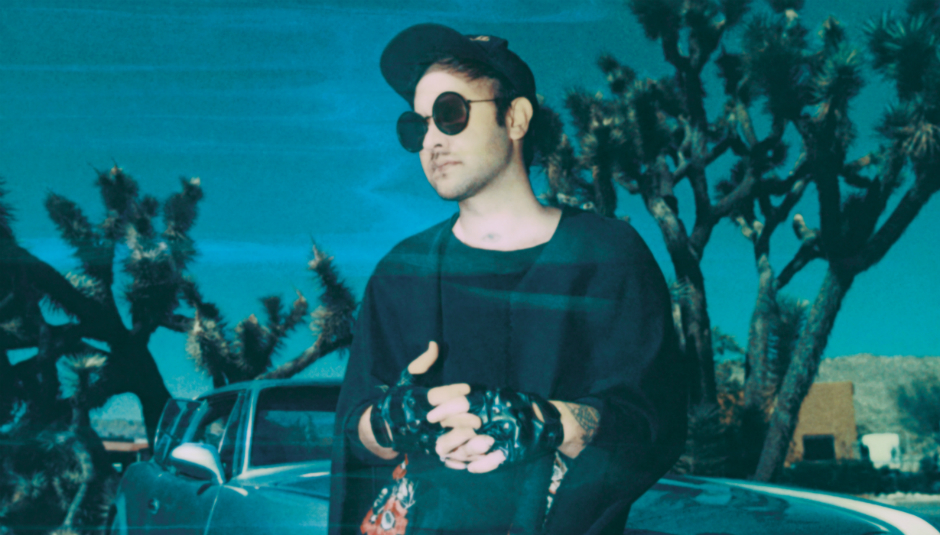The word bootleg is often used now as an adjective to brand an inferior version of something else. In the curious case of Unknown Mortal Orchestra’s Ruban Nielson, ’bootleg’ can is applicable in the most positive sense possible. On his latest long player Sex & Food, Nielson’s touchstones are once again all too familiar. The phased-out cosmic piano mantra of ‘Not In Love We’re Just High’ for example, sounds like a cut from Stevie Wonder’s Songs In The Key Of Life dissolved from its divine altruism to more pleasant narcotic vapours. His sweet ode to his own daughter, ‘Hunnybee’, could’ve easily been a disco yomp in the hands of another artist, but instead breezes by unperturbedly like a lullaby.
Given his obvious gifts as a songwriter, producer and musician, you’d think Nielson could easily make a record in the Mark Ronson or Daft Punk mould: a polished refurbishment of retro sounds that appeals to both young and old. He briefly flirted with this on previous album Multi-Love, and sure, that would at the very least be an interesting prospect for the Kiwi-born, Portland-based recording artist. Although not nearly as interesting as Nielson’s tendency to be Mister Never Quite. He’s Never Quite a backroom player, Never Quite a swashbuckling guitar hero. Never Quite sound poet, Never Quite a soul singer. And you know what? That’s exactly what makes UMO’s music so effortlessly cool and eerily beautiful.
Whether it’s reconfiguring old synths and drum machines, ensnaring a blustering stadium-sized Hendrix-romp like ‘American Guilt’ within the taciturn muddle of tape – Nielson seems adamant about keeping his music in transience. That endearing compulsion to imbue his own neurotic whims into pop totems like Prince, Bowie, Zeppelin and Sly Stone is exactly what makes UMO singular to begin with. In fact, in the bizarro world of Ruban Nielson, there’s always a piercing sense of yearning, like a ghost trying to escape the machine.
The premise of Sex & Food indeed confirms Nielson’s quest for sanctity within the tangible, grounded world he roams constantly. He found secular divinity in the untainted rock sculptures of Reykjavik, looked death in the eye in Mexico City, found romanticism in the monsoon-festered marshes of Hanoi. But for all that, Sex & Food still feels like a familiarly insular UMO record, made by a fellow Pisces who still appears content drifting along with life’s volatile currents.
DiS: The first few UMO years were pretty wild, so I’ve heard. Classic case of thirty-something late bloomer’s syndrome?
Ruban Nielson: No, because my twenties were kind of wild too. But wild in a way that it was almost like an accident. But in my thirties, when I had the chance to be in another band, I was like: “OK, if I had the chance to do it all over again, I would do it this way”. The second time with UMO was wild in the sense that I did it purposefully, I lived the dream I wanted to live. In my twenties, I was in a band (The Mint Chicks) doing wild stuff too, but I wasn’t so much aware of it. I enjoyed myself a lot more, but there was a lot of self-destructive behaviour. But with UMO I was at least older, so when I was down and out, I could still stop myself from falling off the cliff completely. If the same things happened to me in my twenties that happened in my thirties with UMO, I probably wouldn’t have survived.
I had the impression when I interviewed you for the Multi-Love rollout, you made amends with a lot of things in your life. With family, but also the acceptance of your own vices. The aftermath of it got really weird and personal however, and I’m not sure even you were comfortable with that.
Yeah, I supposed with this record finally gotten control over my life, I finally felt like I found a balance, and then suddenly the world turns upside down
On Multi-Love you wrote about things like gender fluidity, which is a hot-button topic now. Do you feel people focus too much on what you internalize as a human being as opposed to what you want to project outwardly?
What felt weird about the last record was how people focussed too much on my personal relationships. But there were lots of other things happening to me at the time, but they weren’t as clickbait-y, because the media presented it as a concept album about a polyamorous relationship. I suppose that sounds kind of cool, but for me, Multi-Love is about many other subjects as well. I suppose I never really thought of it that way. But now, its the same thing: if I told you details about my love life, it shifts the focus, a story to tell so you can write Sex & Food is about this one subject. But the album tells more than just one story; it’s a very fractured and eclectic piece of work. I didn’t want anything to be tied down to one story and have the whole thing revolve around that. It gets a bit boring, you know?
One of the places you visited was Mexico City, and you were in the middle of a big natural disaster. Is it the first time you experienced anything of that magnitude?
I’ve actually been in three big earthquakes in my life. One in New Zealand, when I was in Wellington. That was terrifying. Two of them happened in Mexico: when the first one hit, everyone was still laughing and being drunk, it didn’t seem like so crazy. So I just didn’t worry about it so much either. The second one happened a week later, and it was much worse… I suppose, well, I was worried about dying at first! The first thing I thought was, if I die here, I’m not going to be able to finish my record. It was quite alarming that I seemed more worried about finishing my record than you know… my own life! Dying before I finished my record would be bad timing because I spent so much time on it [laughs]. It gave me this boost of adrenaline to finish the record. When I got back to Portland two weeks later, I was still pretty shaken up… but also very excited to just be alive! Even though I couldn’t finish the record in Mexico City, I still managed to…well, finish the record, because I was so anxious in the aftermath.
It’s interesting that you first thought in the face of death was about finishing the record. Last time I interviewed you, you told me you weren’t sure whether you seek out certain situations to drive yourself creatively, or whether that’s just in your nature anyway.
Yeah, it’s still a mission for me, I realized that. It’s one of the reasons I asked Jake (Portrait) to come to Mexico City with me to finish the record. Of course I was worried about him, because there was this huge earthquake. So I felt I was putting him at risk, and I felt guilty about that. I have to be careful. That’s the same thing about what I said earlier about “the story”: I’m not just talking about my life, but my wife’s life, my family’s life. I’m exposing the lives of other people to this project. So I have to be aware of the fallout if I decide to do whatever I want. I think I’m much clearer on that now, more than I was back then. I was still wondering what I was supposed to do, being creative, honest and open? I realized: “Yeah sure” but at the same time, it’s not my place to expose or compromise other people’s privacy.
But at the same time, you care deeply about those people. And your success with Multi-Love, and with UMO in general, is something I felt you wanted to share. You made that record with your dad, and your brother Kody. That’s not exactly solipsistic.
Yeah, and I want to keep that part of UMO going. I’m incorporating Kody more and more in the writing and in the live show. It’s kind of cool because during Multi-Love it was still a theory for me to involve my brother. He was actually talking to me last night like: “I’m making decent money off of this now, it’s like a chunk of my income now!” And I’m like “Wow, that’s crazy!” I guess I haven’t thought it through as far as that, the fact that he’s so grateful to be part of it too. And now he’s going to be playing in the live band… and, well, that’s really good! [laughs]
But at the same time, I have to be careful when I talk about my life. So my brother and my family members won’t go all: “Did you really have to tell that as part of what you’re doing?” It takes time, but I’m getting better at trying to balance everything. I think my family will hopefully realize that this is ultimately me trying my best. It’s a little bit of a messy process – it’s rock and roll, you have to expect it to be a little bit messy. But yeah, I do feel strongly about being a positive influence for other people.
Last time we spoke, you told me having friends with abuse or mental health problems doesn’t have to be a burden. And their positive influence on your life outweighing the negative influence. They simply need a support system like close friends to become their own extraordinary selves. The final song ‘If You’re Going To Break Yourself’ suggests a friendship in a phase beyond repair.
Not with everyone, but to be honest, at some point, at certain times, you get involved in a certain type of drug use… You know, junkies hanging out with other junkies. I just realized at some point, I don’t want to die. I don’t want to die and leave my kids without a father. And I have more records I want to make. I have more things I want to say before I go. So I decided, I need to make some rules for myself. One of them was: no more opiates, never again. And soon I found out my friends who liked that kind of thing phased me out of their lives. I got ostracized. These are people I love. Friends, people who are really important to me. So I had some things I needed to say to them. I couldn’t say it in any different way.
When me and Jacob were having dinner in Mexico City, and I told him about friends who were messed up, we weren’t doing the same drugs as them. Basically, it comes down to something as silly as that. I said to him: “I was going to write this song to express to them how I missed them, and hear my side of the story.” I literally wrote a lyric about that: “You blocked my number because I stayed alive”. It felt good to write that, because it’s not like I don’t care about them. It’s because I really do. But I also have kids now, and that’s the moment to understand it isn’t about me anymore.
It’s a tough break when friends’ lifestyles take them to radically different paths of life. You ultimately want to keep them close, but forcing that issue can be just as painful as their prolonged absence.
Yeah, but sometimes it just takes time. We all go through different phases, and we naturally drift apart from people, and sometimes you come back together naturally as well. I’ve drifted apart from some friends for like ten years. I recently hung out with a friend of mine from New Zealand; me and my brother used to hang out with him all the time in high school. He was a really great guitarist in those days, the kid at school who could play. But when me and my brother saw him again, it was like the old days. Nothing had really changed. They always say life is short… but life is also kind of long! [laughs]
It’s strange, because social media equates relationships into metrics and mathematics, but once you connect in the real world, even after years, all of that stuff doesn’t matter anymore.
Yeah, sometimes it’s like time travel too. You see people you were cool with when you were still eighteen years old, and then you hang out again, and you literally become eighteen again. And that’s really good! All that time in-between will sort of evaporate instantly. The same jokes, that same immaturity somehow survives.
Seeing your own kids grow slowly into becoming young adults, interacting with the world, does that directly inspire your behaviour as well?
Yeah, particularly my daughter. I have two different relationships with my son and my daughter. My son was the same as me when I was a kid; he just wants to be like me. When I was a kid, I wanted to be just like my dad. For better or for worse. But my daughter, I think she’s smarter than me already. My son wants to be a good person if I’m a good person, so I try to be for that very reason. But for my daughter, I want to be a good person because otherwise, she’ll know. I want her to respect me, or otherwise she’ll be like: “I caught you trying to do this!”
She’s not going to emulate me, so it takes two different approaches. I don’t want my daughter to look at me like “Oh, not this guy again” and just humour me when she asks me something. With my son it’s more direct: if I screw up, he’s going to screw up because he’ll use me as his template. My daughter isn’t two steps ahead of me yet, but I can tell she will be at some point. I can tell that whenever I catch her out, she’ll try and manipulate things. Sometimes I’m onto her and she’ll look at me like: “That’s pretty cool that you finally caught up with what I’m up to!” My son doesn’t assume he can pull a fast one on me, so he doesn’t even try.
Being born to a Polynesian mom and a Kiwi dad, that kind of displacement can feel very nice. But as you get older amidst a pretty chaotic life as it is, do you catch yourself wanting to be anchored by a certain tradition or belief system?
Kind of, but there are a lot of factors in play. Like anything else really, whenever I think I’ve found an answer to something, I immediately notice a detail that undoes it. Polynesian culture has been that for me; it’s still no closer to me than anything else. I think you can say the same about genre; my musical relationship with psychedelic music. I always feel a little bit inept. Same with black music from America: I just never feel quite at home with it, I’m always looking in from the outside. I think my interest lies in margins and borders. I’m somewhat obsessed with borderlines: things between one place and another. I think that started with being born of mixed race, and realising I can never feel at home on either side of the spectrum. I think I’ve gotten to the point where I’m enjoying the in-between spaces. That’s why I like travelling so much. So… I guess I have no choice! [Laughs]
Sex & Food is out now via Jagjaguwar. For more information about Unknown Mortal Orchestra, including forthcoming tour dates, please visit the band’s official website.
Photo Credit: Neil Krug






















